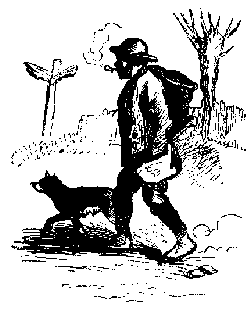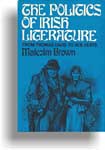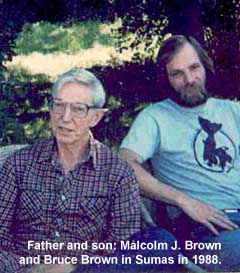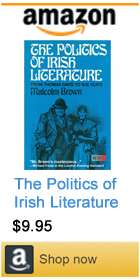Chapter Twenty-four
Literary Parnellism
IN IRISH LITERARY tradition, in Yeats, in Joyce, in O'Casey, an operatic finale is obligatory for Parnell. The strains of Siegfried's funeral march ascend fittingly out of the denouement, for the Wagnerian effect was "really there." We must remind ourselves, though, that the story had a beginning and middle as well as an end, and that the end itself was equivocal. As we watch the curtain call of all the dramatis personae, naturally the leading man will come first to the footlights, followed by Captain and Mrs. O'Shea, by Gladstone and the Nonconformist English voter, by Archbishop Croke and the mob at Castlecomer, by Healy and the Bantry band -- all of them stars with a top billing. But then come the other actors more quickly forgotten: Pigott and his accomplices, the Times, the attorney general, the home secretary, and Sir Rowland Ponsonby Blennerhassett (some find it very hard to keep in mind the frame-up); followed by "the hillside men," whose unexpected entry into the last scene when Parnell called them to his side suddenly set afire Healy's previous indifference to the sexual scandal; and at last Lalor and O'Leary, who had repeatedly said for two generations that the English party system and the circumambient air of Westminster would corrupt any Irish patriot and blunt any Irish parliamentary assault.
As I have pointed out, the Fenians were pleased to magnify the revolutionary nationalism embodied in Parnell's name, while they simultaneously combated the destructive factionalism that fed at the same source. Their campaign against the "nine years's vituperation" of the Split gradually took hold of Irish politics. Yeats himself became in time almost mellow toward Tim Healy, and he looked with an adulation that some think excessive upon the most formidable champion of the "Sullivan gang" (his own phrase), T. D. Sullivan's grandson, the "pitiless" Kevin O'Higgins. The Sullivan gang, in reciprocity, made Yeats a senator of the Irish Free State. When the homicidal face of the Split had passed into slow eclipse, the Fenian slogan, "Parnell is dead," came true at last. In literature, though, Parnell was patently anything but dead. Parnellism as a literary phenomenon enjoyed a vigorous life history of its own, with many surprises.
The first literary reaction to Parnell was not adulatory. George Moore and Lady Gregory begrudged him more than the minimum of formal respect that was due to his power to injure them as great Irish landlords. I have described how George Moore, indulging his Balzacian impulse to record clinically the nerve spasms of his panic-stricken fellow landlords, had meanwhile held himself ready for the surrender. Lady Gregory was less public in articulating her attitudes, and they have to be reconstructed.
While still Miss Augusta Persse she had watched the opening of the land war from her family's great estate at Roxborough, county Galway. In March 1880 at age twenty-eight she married a neighboring sexagenarian landlord and colonial administrator, Sir William Gregory, and moved over to Coole Park. It too was under Land League siege. Her biographer tells that the Gregory family did not carry firearms for protection, explaining that they had no reason for fear because "Coole was on the side of the people" always. This explanation credits Sir William's genial urbanity, but it forgets the Gregory clause and the famine clearances. Sir William had been a governor of Ceylon, but he was apparently an unorthodox colonialist, for in visiting Egypt he and Lady Gregory expressed open sympathy for the native revolutionists. Their liberality to the Egyptian fellahin did not extend to Ireland. During the debate on the first Home Rule bill in 1886, Wilfred Blunt recorded a conversation with Lady Gregory about the Irish crisis:
- Called on Lady Gregory, who is growing very bitter against my politics, if not against me. It is curious that she, who could see so clearly in Egypt when it was a case between the Circassian Pashas and the Arab fellahin, should be blind now that the case is between English landlords and Irish tenants in Galway. But property blinds all eyes, and it is easier for a camel to pass through the eye of a needle, than for an Irish landlord to enter into the kingdom of Home Rule. She comes of a family, too, who are "bitter protestants," and has surrounded herself with people of her class from Ireland, so that there is no longer room for me in her house.
This attitude was certainly not final, but it does chart her point of origin in "bitter" Protestantism and in eyes "blinded" by ownership of a house shaken, as Yeats's indignant poem said, by the land agitation.
Each of these two wounded Connaught landlords felt an understandable urge to write off Ireland and go away. Lady Gregory described herself as an emigrant and set up a London salon. After she was widowed in 1892, she put her son in Harrow and took up professional editorial work in England, preparing her late husband's family archives for publication. Meanwhile, Moore systematically eradicated his Irish past and proclaimed himself more English than Dickens, citing the British success of his new novel Esther Waters as proof. It was not until some years later that W. B. Yeats, acting as a talent scout for the Irish literary movement, discovered him and Lady Gregory, found them work to do, and ordered them home...
|
|
Table of Contents
|

|
Astonisher.com is pleased to offer these excerpts from The Politics of Irish Literature by Malcolm Brown...
Praise for
The Politics of Irish Literature |
 |
|
"This brilliant study of the intersection of politics and literature in Ireland amounts to a dazzling portrait gallery. Reading it one feels about one the breath, warmth, and passions of the dead all come alive again."
-- Sean O'Faolain in the Manchester Guardian
"Mr. Brown's masterpiece has made me want to hire a nearby housetop and recite whole chunks to every passerby..."
-- Michael Foote in the London Evening Standard
"The author of the best book on George Moore now gives us what is in all likelihood the best book on the politics of modern Irish literature."
-- Virginia Quarterly Review
|
|

University of Washington Professor Malcolm J. Brown (1910 - 1992) with his son, Bruce Brown, in Sumas, WA, July 1988.
|
Additional reading -- Malcolm Brown's George Moore: A Reconsideration. Also see Bruce Brown's commentary on The History of the Corporation for Malcolm Brown's contribution to that work.
|
|
|






